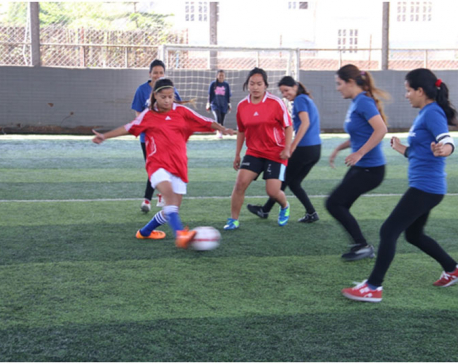
OR

It’s a long way for Nepali women to freely choose their partners as they want, when they want and how they want, pre-wedding or post-divorce
Breaking the taboo about divorce, remarrying and step-parenting is definitely not an easy feat. To even start a conversation involving these topics in the context of Nepal would be just scratching the surface and therefore, it is pertinent that someone started a conversation regarding this.
I’ve heard, seen, witnessed and first-hand experienced unimaginable wrath from Nepali people toward those who simply choose to end a relationship and welcome an ignominious fate.
Divorce involves two people and therefore it should invariably be those two people making that choice and decision in an amicable way just like marriage, unless there’s abuse and violence involved. But Nepali society, regardless of where they are (be it in any other continent or in Nepal), have traditionally only pointed fingers at women divorcees, thus making it a taint in their character that lasts a lifetime.
Typically, women divorcees have been shamed, name-called, their morals doubted and almost abandoned by the intertwined circle of friends and family. Unless and until Nepali people consider the issue of divorce as a normal course of life for couples who deem it irrevocable, question of remarrying cannot be addressed. A society that doesn’t see divorce as a change to one’s marital status, a society that doesn’t consider divorce to be far more safer option than having a violent or life-threatening end, cannot even fathom the notion of re-companionship in that same lifetime. A woman is likely to be disowned by her own parents for even contemplating separation from her partner despite the valid grounds.
We can only imagine the callous resentment and social defamation from such constricted mindset like that of Nepali people when a divorced woman dares to open up to the idea of dating or remarrying.It’s a long way for Nepali women worldwide to freely choose their partners as they want, when they want and how they want, pre-wedding or post-divorce.
Unequal norms
Ground reality is that men are freer to remarry because they don’t necessarily take on the responsibilities of bringing up kids and subsequently women are conditioned to focus on kids rather than looking after their need for companionship. Why isn’t there a big kerfuffle when a man marries another woman in a very short while after being widowed or divorced? Why is there incomprehensible gasps and gossips if that was to be initiated by a widow or a woman divorcee? There’s a lopsided support for men in general in our Nepali context to begin with.
Another issue considered as a taboo in Nepal is step-parenting. Having created a blended family myself, I can certainly point out that it takes humungous fortitude for a Nepali man to even contemplate the idea of marrying a divorcee with her kids in tow. When a woman remarries, she cops name-callings and invariably a tag of a “son-snatcher” as if the man she married did not make that decision; as if all men who choose progressive women who remarry, were merely duped into it.
In most western society, being with a person, regardless of each partner’s previous marital status, regardless of the kids from previous relationship, takes priority. Western society, in general, with some exceptions, are open to such relationships because love, companionship and a peaceful home is far more important than copping societal accusations or step-parental awkwardness.
As for Nepali step-parents, society makes it sound awkward especially for women. As if being a parent completely rules out the need for anything else, as if kids from another relationship automatically invalidate and threaten current companionship. The day our Nepali mindsets know how to grapple with relationships in dynamic roles, it’ll be the beginning of normalcy in supporting broken homes and restarting companionship. Moreover, a single dad would almost always have his parents helping him raise his kids as opposed to single mothers who have to toil hard on her own especially when her own family is reluctant to acknowledge, let alone endorse her changed marital status.
We have seen and heard many such cases. If the disparity between the genders already exists for life altering decisions like divorce, remarriage and step-parenting, we need to talk more on how to close that gap on gender perspectives first before moving on to step-parenting plights in a broader view. Men and women have always been treated differently and until there’s a balanced treatment and expectations regarding divorce, remarrying and step-parenting, there won’t be a “balanced” acceptance.
There are very few trailblazers breaking these taboos and their tremendous effort shouldn’t just be limited to their periphery. We need more people to be the voice of people who can’t speak for themselves in order to leave a positive and peaceful life.
Be the change
Society is made up of people like us. We, as individuals and collectively as a society, need to support, accept and create a progressive platform within our community to let families decide even if they want to go separate ways. Change always starts from home.
We need to be more aware and accepting of the factors that influence a relationship to either sustain or wither away. In a world of instant gratification and intolerant egos, in an era of explorative teenagers and wayward adults, in a competitive edge of rat races and never-ending ambitions, in a time of warped traditions and increasing violence, in a trap between new relationships and the expectations it ensues, in a progression of dynamic roles between partners, companionship has become exclusively tough to maintain.
With these overwhelming factors, divorce should no longer draw eyebrow-raising expletives and reactions. Just like with any kind of loss, divorcees should be allowed to mourn and move on at their own discretion and pace. Their decision to remarry, after however soon or late, especially for women, should be entirely their discretion, just like it has always been for men. In the age of financial independence, gender equality and switchable professional roles, it’s about time we allow these life altering decisions in women’s hands too.
The author teaches Nursing in Australian Catholic University, Sydney
You May Like This

Futsal for the women, by the women and of the women!
KATHMANDU, March 19: WE United Project launched the Mahila Premier League (MPL) on March 18 at Grassroots Recreational Center in Mandikhatar. ... Read More...

President Women Upliftment Programme inspiring Bajura women to aspire
BAJURA, March 25: Women in Bajura district, which is in the last position in the Human Development Index (HDI) in... Read More...

Helping women re-envision a better Nepal: Women LEAD Nepal
KATHMANDU,March 7: Women LEAD Nepal started as an idea that women and girls could change the trajectory of Nepal’s future and... Read More...







Just In
- NRB to provide collateral-free loans to foreign employment seekers
- NEB to publish Grade 12 results next week
- Body handover begins; Relatives remain dissatisfied with insurance, compensation amount
- NC defers its plan to join Koshi govt
- NRB to review microfinance loan interest rate
- 134 dead in floods and landslides since onset of monsoon this year
- Mahakali Irrigation Project sees only 22 percent physical progress in 18 years
- Singapore now holds world's most powerful passport; Nepal stays at 98th












Leave A Comment